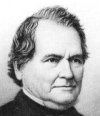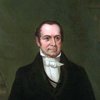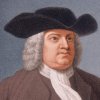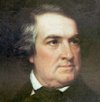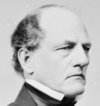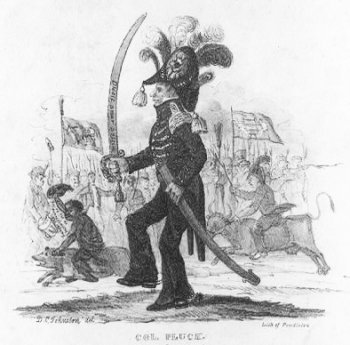Mr. Cummin, of Juniata said,
that he rose to give his views on the amendment which had been proposed by
the gentleman from the county of Philadelphia,
(Mr. Brown,) in reference to
religious privileges. He had before him the memorial which had been presented
from the society of friends, praying not only for exemption from military
duty, but from the payment of all equivalent for it. It was his object to
wipe away the stain which was thus cast on the bill of rights, which declared
that we were all equally free; that no distinction should be made; and that
no religious privilege should be granted to any one over another. Neither
conscience, nor the principles of conscience were well construed in this
memorial. The memorialists set forth that all wars and fightings were anti
christian; or, in their own words “that all wars and fightings are adverse to
the peaceable principles taught by the holy promulgation of the christian
religion.” He did not doubt that this Convention would do its duty to the
whole people of the State and to the nation; and it was his intention to
submit a few arguments, which might not be very familiar to the members of
the Convention, but which he thought would establish the obvious fallacy of
the positions assumed by these memorialists.
It was laid down in the memorial, that all wars were anti-christian. — Now,
he would ask what member of this Convention would desire to record his name
as an infidel? And yet there were but two alternatives presented. That which
was not christian was infidel; as in the olden times, there were only two
denominations of people, and those who were not Jews were Gentiles. Thus
there were but two classes in ancient days, and there were only two classes
now.
The memorialists undertook to shew that all wars were anti-christian, and
they claimed an exemption on several grounds. First, that they had a charter
from William Penn. But
William Penn,
Mr. C.
contended, made no such grant, and had no power to make it. The petitioners
had misconstrued the rule of conscience. They could never say that they were
interrupted in the full exercise of their consciences, until their church
doors were invaded, or until they were prevented from enjoying those
religious professions and practices which were the objects of their own
peculiar choice. He did not know, nor did he believe that they had ever been
interrupted in their mode of worship, or even called to account for any act,
having reference to their peculiar faith. They claimed themselves to be the
followers of the Prince of Peace, and therefore, they said that all wars were
anti-christian. We all knew what was the character of the Prince of Peace; at
least all of us knew, who had looked to his principles as the only rule and
guide, not only in the things of time, but of eternity. They were some of
them principles which the memorialist had overlooked. Abram kept 318 trained
militia men, born in his own house, and led them on to battle. And, when he,
(Mr. Cummin,) spoke of the
grounds on which the memorialists based their claim, looking as they did, to
the Prince of Peace as their great polar star, might he not refer to the
acts of the government of the Prince of Peace, to ascertain what analogy
there was between the two? He would not now touch upon the glory of the acts
of the Prince of Peace, although he might do so hereafter. On examination,
it would be found that those who had fought the battles of their country in
all ages, were a people highly favored. — The first battle we read of
in history, was that of the four kings who went up against Sodom and
Gomorrah, and slew five kings. And then took with them the goods of Sodom
and Gomorrah, and took Lot the nephew of Abram, who resided in Sodom, and
took away all his goods. Abram was told of the capture of his nephew,
mustered his 318 men; divided his army; followed the enemy for upwards of a
hundred miles, near to Damascus; and subdued the four kings who had subdued
five kings. Was this a stain upon the character of that great man, the father
of the faithful? Surely not; it was a great honor and glory. He saved their
property, and Melchizedek went out to meet him, and there called him “Abram
of the most high God — the possessor of Heaven and earth.” — This was the
first battle recorded, either in holy or profane history; and this went to
establish the point, that those who fought the battles of their country were
the eminent favorites of God; and indeed we had the authority of the King of
Heaven and earth for saying so. Again: Look at the overthrow of Pharaoh and
all his host in the midst of the Red sea! Was it not one of the greatest
wonders ever known in the world? The Almighty directed his own peculiar
people through that land of wilderness! and how soon were they called upon
to muster their armies? I believe, said
Mr. C.,
in one year and two months after their passage out of the land of Egypt; and
in the first chapter of the book of Numbers, it will be found, that the word
“war” is mentioned no less than sixteen times. The Almighty not only directed
them to number the people to go forth to war, but Himself appointed the
officers that should rule over them. What, was the language of the Most High?
Take ye the sum of all the congregation of the children of Israel, after
their families, by the house of their fathers, with the number of their
names, every male by their polls.
From twenty years old and upwards, all that are able to go forth to war in
Israel; you and Aaron shall number them by their armies.
And with you there shall be a man of every tribe; every one head of the house
of his fathers.
How, said Mr. C.,
will this language compare with the prayer of these memorialists, or how can
they reconcile their conduct to such acts as these?
In the second chapter of the same book, these tribes are all marshalled and
stationed. And by whom? By this same Prince of Peace. He was a
leader and commander over the people. He designated those who should
be the commanders of the tribes; pointed out their stations; and had the
whole twelve tribes marshalled in battle array. This was done under the
immediate direction of the Great Prince of Peace, a mightier general than
ever entered the field of battle. The tribes were attacked by the Amalekites;
and the priests of the Lord led them on to battle. And Moses and Aaron and
Herr, sat upon the mountains holding up the hands of Moses, for it so came to
pass, that whilst Moses held up his hands, the children of Israel prevailed,
and when he let down his hands, the Amalekites prevailed. And the children of
Israel conquered the Amalekites, and put them to flight. And the Lord then
spoke with Moses and said: “Write this for a memorial in a book, and rehearse
it in the ears of Joshua; for I will utterly put out the remembrance of
Amalek from under Heaven.”
And Moses built an altar, and called the name of it Jehovah — nissi.
For he said, because the Lord has sworn that the Lord will have war with
Amalek, from generation to generation.
But, Mr. C.
said, he would now leave this part, and advert for a moment to the conduct of
Saul, who disobeyed the voice of the Lord in saving the life of the king of
the Amalekites, and in refusing to destroy their sheep and their oxen. For
this, Saul was dethroned. And in all those ages, we found that the Almighty
said that his angels should go forth before his own peculiar people, armed to
destroy the heathen nations and to claim the land before them.
These points, Mr. C.
said, were incontrovertible. No human being would attempt to deny that the
Lord was their judge, their law giver, and the captain of their armies. He
would now proceed to show what Joshua had done when he crossed over Jordan
into Canaan, for the purpose of subduing the inhabitants of that country. Was
any general ever able to do what he accomplished? Was Cæsar or Napoleon
capable of beating down the walls of a great city like that of Jericho with
the sound of a rams horn? It appeared that when Joshua was near Jericho, he
went out to amuse himself, and he saw a man armed with a sword. He was
somewhat taken by surprise, but he went up to him and said, “Are you for us,
or for our adversaries?” The man replied, “Nay; but as captain of the host of
the Lord, am I now come.” Who, he asked, would undertake to contradict these
historical truths? And, how did they contrast with the prayer of the
petitioners? Men who seemed to think it anti-christian to fight the battles
of the Most High. These men went so far as to contend that they were not
bound to protect themselves and their country. He
(Mr. Cummin)
would insist on the contrary, that they were. The fact was placed beyond all
cavil and dispute, as he thought he had already shown. These people should
be compelled to pay for their defense; and there was no good reason that
could be urged why they should be excused. We all knew that after the
Israelites were defeated at Ai, Joshua threw himself on the ground and kept
his face fixed upon the ark of the Lord until the evening, and lamented
bitterly that his God should have brought the enemies of the Israelites
against them. The Lord tells Joshua to rise, and having done so, he tells
him of the transgressions of the Israelites, and promises them pardon, and
gives him directions as to how he shall divide his army and the manner in
which he may take the city.
Mr. C.
would ask if that which the Almighty had done was anti-christian? Would those
belonging to the denomination of Quakers say this? Why, then, was it, that a
portion of the people of this State should ask to be exempted from the
general duties of the whole community? Was ever such a thing known as a
government making this distinction? Mary, the mother of our blessed Redeemer
had to pay a tax, and she paid it without a murmur. What, he would inquire,
was recorded in the book of Judges? Why, that Sisera, the captain of king
Tobias’ army, was delivered by the Lord into the hands of Jael, who slew him
by nailing him to the ground when asleep. “So God,” in the language of
Scripture, “subdued on that day Jabin the king of Canaan before the children
of Israel.” Here, then, was another instance of the assistance of the
Almighty being rendered to the people of Israel. What did gentlemen here say
to the song of Deborah? In his opinion, it was a most delightful song. It was
full of praises to the King of Israel, and of praises to those who fought the
battles of the Lord. “Curse ye Meroz,” said the angel of the Lord, “curse ye
bitterly the inhabitants thereof; because they came not to the help of the
Lord, to the help of the Lord against the mighty.” The case of Samson,
slaying the Philistines,
(Mr. C.
proceeded to remark,) was a memorable instance of God’s interference for the
protection of his servants. Samson was a man of war, for “the dead which he
slew at his death, were more than they which he slew in his life.” And, he
had previously slain a thousand of his enemies with the jaw bone of an ass.
But, said the petitioners, “it is anti-christian to fight!” He thought,
however, that they should be satisfied to be on an equal footing with their
fellow citizens. They should be careful, too, how they cast reproaches upon
men who would fight the battles of their country — who deemed it to be their
duty to do so, and who did not think it anti-christian. He would refer to
some other passages in the scriptures for the purpose of showing that God had
sanctioned and aided his people in their battles against the wicked. In the
13th chapter of the second book of
Chronicles, it would be found that Abijah, king of
Judah, with his 400,000 men, fought and obtained a triumphant victory over
king Jeroboam, killing 500,000 men of the 800,000, which he brought into the
field of battle. The Lord was the captain of the army of the children of
Judah, who thus prevailed, “because they relied upon the Lord God of their
fathers.” It was recorded also, of Asa, who succeeded to the throne of Judah,
on the death of his father Abijah, that he most signally defeated the army of
Zerah, the Ethiopian, because God was with him, and approved of the acts of
his reign. Of king Hezekiah it is related in Holy Writ, that when Senacherib,
the king of the Assyrians, was marching against him, the Lord sent an angel
which destroyed 185,000 of his camp in one night. This,
(Mr. C. remarked,)
was another instance of the Almighty’s interference in behalf of those who
serve him. We found that the military achievements, concerning which, so much
is said in the sacred volume, were usually preceded by a prayer, and praises
sung to the Most High, and that victory was given to those who best deserved
it. The Prince of Peace was humble and inoffensive, but was a terror to the
wicked. He (Mr. Cummin,)
maintained that fighting was not forbidden by the Scriptures — that is,
fighting in a just cause — fighting in defense of a man’s country.
Mr. C.
said, he would turn to the New Testament for the purpose of showing what was
the character of the fighting men there spoken of. He referred to the third
chapter of Luke, 14th
verse: “And the soldiers likewise demanded of John the Baptist, saying, and
what shall we do? And he said to them, do violence to no man, neither accuse
any falsely; and be content with your wages.”
How different, (continued Mr. C.) is the advice of John the
Baptist, from that of the language held by the petitioners. They say that no
soldier can be a christian — that all wars and fightings are anti-christian:
consequently it follows, according to the Quaker doctrine, that they who
fight the battles of their country, put themselves beyond the reach of Divine
mercy.
He would say a word or two in regard to the centurion, who went to our
Saviour and prayed him to restore his servant to health. He had the most
implicit faith in the Redeemer, and knew the miraculous powers which he
possessed. The centurion, after asking that his servant should be healed,
used this language: “I also am a man set under authority, having under me
soldiers, and I say to one, go, and he goes; and to another, come, and he
comes; and to my servant, do this, and he does it.” The sick man,
(Mr. C.
said,) was immediately made whole, was completely cured. How different was
the conduct of the centurion as contrasted with that of the petitioners. He
was kind, gentle and confiding in his manner, and uttered not a syllable
calculated to wound the feelings of the most sensitive. He
(Mr. C.)
wished he could say as much in reference to the character of the memorial
from the society of Friends.
He next related the particulars as connected with the Centurion’s
having sent for Peter, the apostle, in order to show that neither Christ nor
his apostle, ever gave the slightest rebuke to any man, because he happened
to be a soldier.
Having said a great deal in relation to the military character, he would now
throw out a few observations as to the duty which every citizen owes to his
government. In all countries, no distinction is made between men in regard
to contributions for the support of the government. The memorial, however,
which had been presented from the friends, contained a strong argument
against calling upon them for their aid in defending the country when
necessity requires. They contend that it is anti-christian to fight, and are
themselves unwilling to do so, but do not object to pay an equivalent. Now,
he would ask gentlemen here, what was the difference, in a moral point of
view, between a man fighting himself and getting another to fight for him?
For his own part, he must declare that he could not perceive any distinction
whatsoever. The gentleman
(Mr. Cope,) had gone into a
detailed account of the enormous sums which they had paid for taxes, paid
three times the amount of other denominations, that they had been distrained
for it. He said that they supported their own poor. Well, (remarked
Mr. C.) what have
we to do with that? They have a right to pay their share towards the support
of the poor of all denominations. — Some of the Friends estimated their
property at $300,000, and some at 200,000. This was a matter entirely under
their own control. Why should they, then, refuse to serve as militia men, or
to pay towards its support? They say they will not pay nor they will not
fight, but they have no objection, when the hour of necessity shall arrive,
to pay others for shooting down their fellow men. The gentleman who presented
the memorial of the society of friends, considered that there was no moral
difference between paying a man for shooting another, and doing the act
yourself: and on this ground he desired to be exempted from any pecuniary or
personal obligation.
Are not the Quakers on an equal footing with the rest of the community in
regard to rights and privileges? Certainly they are, and yet they refuse to
do those things, which, according to the bill of rights, they ought to do, to
be entitled to partake of the rights and privileges guaranteed by that
instrument. He would relate an anecdote by way of parallel.
Gen. Jackson understood how
to manage matters of this sort. Just before the siege of New Orleans, when
the General was putting that city in a state of defense, he seized some
cotton bags; and a Frenchman came to look for his cotton, and he remarked to
the General “you have got my cotton bags — that is my cotton.” “Well then,”
replied the General, “if that is the case, you are just the man to fight for
it, and I will put you in my band.” So, therefore, (said
Mr. Cummin) ought these
Quakers to fight for their property — ought to be made to defend it. If those
who were denounced in this memorial had acted upon the principles laid down
by the society of Friends during the revolution, and had refused to fight the
battles of their country, we should have been slaves to Great Britain to this
day. During the revolutionary war, there were more traitors by ten to one, of
Americans than of foreigners. He asked if there was a man present who had a
relative in that war, who would support the prayer of the petitioners. He
contended (and he admitted that he was using strong language) that any man
who would go for granting the prayer of the petitioners, wrote himself down
an infidel. If they did not comply with those requisitions upon which the
bill of rights was predicated, and which entitled them to all the rights and
privileges therein set forth, the members of the society of Friends certainly
ought to give up their seats in this Hall. It might be considered bold in him
to speak in the presence of those who were interested in this matter, but he
could not help expressing his sincere hope that when the question should come
up for the final decision of this body, that the Friends would not vote for
it. And, if they should set up that they are the followers of the Prince of
the Peace, he
(Mr. C.) would
undertake to show that they are not. He maintained that every one was in duty
bound to support the government under which he lived, and he referred to the
conduct of Christ as illustrative of what was the duty of all good citizens.
It was recorded in the Gospel of
St. Luke that spies were sent
out by the chief priests and scribes to watch Christ, and they addressed him
in this language: “Master, we know that you say and teach rightly, neither
accept you the person of any, but teach the way of God truly. Is it lawful
for us to give tribute to Cæsar or no? But, he perceived their craftiness,
and said to them why tempt you me? Show me a penny. Whose image and
subscription has it? They answered and said, Cæsar’s. And he said to them,
render, therefore, to Cæsar the things which be Cæsar’s, and to God the
things which be God’s.” No man (said
(Mr. Cummin) can contradict
the truth of this. It was, then, as clear as the sun that shines at noonday,
that every man being under a government has a right to contribute to its
support. This was a universal understanding throughout the world.
He would refer to another portion of Scripture.
Mr. C.
then read the following verse:
Let every soul be subject to the higher power, for there is no other power
but of God, the persons that be are ordained of God. Whosoever resists
power, resists the ordinance of God. And they that resist, shall receive to
themselves damnation.
Mr. C.
asked what the petitioners would think of this authority. It was certainly
strong and emphatic language, but it was, nevertheless, the language of
Divine inspiration, introduced by the apostle. It was not an expression of
his own private judgment, but that of the judgment of God, and his rules and
his laws must be obeyed. The petitioners seemed not to regard this language,
and they complained that their society in Philadelphia had had to pay
$300,000 taxes. Now, this was their own fault, and occasioned by their
rebellion to the government. And, so they admitted; then why not pay their
share of taxes as other portions of the community do?
Mr. C.
said that this was a denunciation against those who refused to contribute
towards the support of the government, and every man who heard him knew that
he spoke the truth. “For rulers are not a terror to good works, but to the
evil. Will you then not be afraid of the power? Do that which is good, and
you shall have praise of the same. For he is the minister of God to you for
good. But, if you do that which is evil, be afraid; for he bears not the
sword in vain; for he is the minister of God, a revenger to execute wrath
upon him that does evil. Wherefore ye must needs be subject, not only for
wrath, but also for conscience sake. For this cause pay ye tribute also; for
they are God’s ministers, attending continually upon this very thing.”
As he had stated in the outset, were men ever interrupted from worshipping
God according to the dictates of their own consciences, and where there were
none to make them afraid? For, as the Scripture says in reference to obeying
the rulers of the land: “Render, therefore, to all their dues; tribute to
whom tribute is due; custom to whom custom; fear to whom fear; honor
to whom honor.”
He, (Mr. C.)
did not pretend to be an expounder of Scripture [emphasis mine — ♇], yet he conceived there
was nothing plainer to be deduced from that book than that it was the duty of
every man to contribute towards the support of his government. Why, then, he
would ask, did the society of Friends suffer themselves to be levied on? Why
did they not pay their taxes as other good citizens did? If they had done
this, they would not have had their property seized, and about which they
complained. If they were the friends of peace, as they professed themselves
to be, why did they not comply with the requisitions of the land? Why did
they not do those acts which would prove them to be the friends of peace?
Conscience is a principle of the mind, a principle of the soul. It is God’s
vicegerent in the heart. It approves what is right, and disapproves what is
wrong.
Mr. C.
contended that according to the language of the sixth verse of the
13th chapter of Romans, which he had already read — men were bound to support the government which protects them, even though
it be a heathen one, and ought to pray for its peace and prosperity, so long
as they shall be allowed to exercise their rights and privileges like the
rest of the community.
He (Mr. C.) asked
if the petitioners had complied with any one of these requirements. Those who
had sat in this Hall to form a Constitution for generations yet to come, and
had not fulfilled the law, and held to the doctrine of equality, offered an
insult to those who had complied with the requisitions by all, imposed upon
them. It was quite evident that no human being could be exempted. Supposing
that other citizens were to follow the example of the Friends, and refuse to
contribute to the defense of the country, how could it be protected? And,
what would be the consequence? Why, the enemy would overrun the country,
annihilate the government, and murder men, women and children. Now, under
such a state of circumstances, he would ask if the petitioners would contend
that they, in common with every other citizen were not imperatively called
upon by laws divine as well as human, to defend their country? He maintained
that the Bible abounded in instances, many of which he had already cited, in
which the Lord had encouraged and aided the people of one nation in defending
themselves against the attacks of their enemies. He insisted that ever since
there was any organized society in the world — taxes had always been paid for
the support of government, and he who did not know that fact had read the
Scriptures to little purpose. Why should these petitioners not submit to the
law, do as others have and still do, and not set themselves above their
neighbors? They should conform to a law by which others were governed, and in
which the whole community was equally interested, for it was entirely
fruitless to attempt to escape the payment of the militia tax.
My God what a blowhard. He picks a handful of obvious scriptural
counterexamples to the idea of conscientious objection to war and declaims
them as if he’d just come from decoding the very first translation of the
Bible from the original hieroglyphics — “a few arguments, which might not be
very familiar to the members of the Convention.” Then he can’t decide whether
he’s denouncing pacifist Quakers as hypocrites for being willing to pay for
substitutes to fight in their place, or denouncing them as unpatriotic for
being unwilling to do so.
But this opened the floodgates, and from here on out the arguments — ostensibly
about a Constitutional provision — included plenty of debate about
what the Bible really means and whether or not pacifism is a reasonable
position to take and whether or not the Quakers are good people and good
citizens and so forth.
Which is what makes this all a little more valuable than a debate among
lawyers about law would be. This is largely a story of people who are not war
tax resisters or pacifists trying to come to grips with what war tax
resistance is about and to what extent it’s reasonable — although, as this
example showed, for “reasonable” you sometimes have to insert “supported by
scripture,” which requires a flexible sanity.

